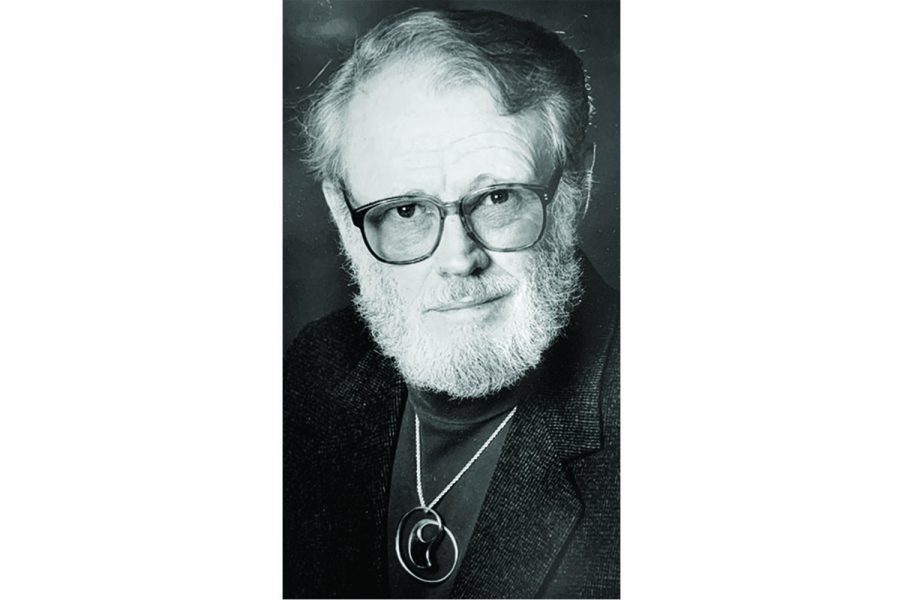‘Wonderful mentor,’ former UI Theatre Arts professor David Thayer leaves lasting legacy
David L. Thayer, retired professor of Theatre Arts and former department chair, died on April 2 at 90 years old, leaving behind a legacy that transformed the Theatre Arts Building into what it is today.
April 14, 2020
A gifted artist, an inspiring professor, and a trusted friend, former University of Iowa Theatre Arts Professor David L. Thayer left behind a legacy that has had a lasting impact on the Department of Theatre Arts, even long after he officially retired. Thayer, 90, died April 2.
Thayer was a full-time faculty member at the University of Iowa for 42 years, from 1955 to 1997, where he headed the Design Program and the Theatre Technology Program for several years. Thayer also served in numerous other leadership positions throughout his time at the UI, including Interim Department Chair.
According to Alan MacVey, the director of the Division of Performing Arts who was hired during Thayer’s time as chair, Thayer was a “wonderful mentor” who he often turned to for advice and support.
“He was always direct, didn’t pull any punches, but was also honest and kind,” MacVey said. “He would tell you exactly what he thought, and right as you started to feel a little defensive, he’d find a way to put everything into a context that made it okay and allowed you to really hear his point.”
Thayer designed lighting for over 280 productions during his time at the UI and, according to a memoriam page on the UI Theater Department’s website dedicated to Thayer, he played a significant role in creating the designs for the 1985 addition to Mabie Theatre, which formed the Theatre Building. The new building featured two experimental theaters that were originally named Theatre A and Theatre B.
When Thayer retired in 1997, Theatre A was dedicated to him in honor of the important work he did at the UI and was rechristened the David Thayer Theatre. The theater is now an important space used to experiment with creative light and set design.
According to his colleague and former student Bryon Winn, the additions to Mabie Theatre were Thayer’s most important contribution to the Theatre Arts department.
“For many of us, if David’s single legacy was the creation of [the Theatre Building], it would be sufficient,” Winn said. “Every significant artist who has passed through the building has commented on this spectacular venue, and it is a testament to David’s vision. When we talk about audience interaction, or immersive theater, or highly theatrical design, this is the venue that we all envision.”
RELATED: Legendary Iowa football coach Hayden Fry dies
Thayer also received the Kennedy Center/ACTF Gold Medallion for Lifetime Service in 1997, although his retirement was not the end of his service to the UI. Thayer continued to teach as an adjunct professor and occasionally designed for UI productions until 2016.
Thayer was also active in many other areas of the Iowa City community after his retirement. According to Winn, Thayer designed over 60 productions for organizations like Riverside Theater, the School of Music Opera program, and Iowa Summer Rep.
Winn praised Thayer’s excellency as an instructor, and all the ways he impacted his students’ learning process and career paths.
“He has mentored hundreds of students and his impact on the profession is felt throughout the country every day,” Winn said. “Every single one of these students was grateful for the opportunity to work with someone so knowledgeable and so willing to share in the creative process. They found him a joy to work with on each of these projects, and the way they approached their own design work would change based on this experience.”
Thayer’s death means a great loss for the UI Department of Theatre Arts, as well as the Iowa City community, but Winn expects that Thayer’s voice and legacy will continue to be recognized at the UI for decades to come. While the lasting nature of Thayer’s contributions is undeniable, his death has deeply affected his students, colleagues, and friends.
“We will miss his decades of institutional knowledge,” Winn said. “We will miss his perspective, his patience and warmth. Mostly, we will miss him as a good friend.”



